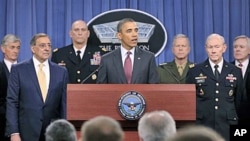U.S. military leaders say they have begun preparations for a new, leaner military as Washington prepares to make cuts in the defense budget. Washington wants to reassure its allies, though, that it will remain engaged with them.
The branch of the military to be hardest hit is the U.S. Army, which will see the reduction of more than 70,000 ground troops and the removal of two brigades from longtime bases in Europe.
The head of the army, General Ray Odierno, spoke to reporters Friday, a day after Defense Secretary Leon Panetta announced the cuts.
“We grew the army in order to meet our commitments in Iraq and Afghanistan. I’m comfortable now that in fact we’re done with Iraq. Our commitments are coming down in Afghanistan that we can now do this," said Odierno. "I don’t see this as we’re bearing the burden of it. I’m saying we’re making a correction based on what we see out there as a potential threat.”
Commitment continues
Odierno says the U.S. Army remains committed to its partners around the world, including those in Europe where the United States expects to accelerate what has been a gradual reduction of forces in Germany and elsewhere since the end of the Cold War.
Under a NATO agreement, the United States is obliged to help defend the nations of Europe in the event of attack. Michael O’Hanlon, a security analyst with the Brookings Institution in Washington, said the new U.S. strategy does not appear to counter that agreement.
“Europe is not under threat for the most part. We’ve already scaled back a lot in Europe. Europe is not going to be threatened by anybody and they have a lot of good armies themselves,” said O’Hanlon.
The U.S. defense secretary is expected to reaffirm the U.S. commitment to NATO in the coming days when he visits its headquarters for a meeting of defense ministers. In October, Panetta called for NATO countries to carry more of the alliance’s defense burden.
The U.S. says its military will remain committed to its partners in the world, but those commitments will be different from a time when it maintained large bases to guard Western Europe from the Soviet threat.
Focus on Pacific
The U.S. military’s attention now turns to the Pacific in the face of China’s growth, while keeping forces ready to deal with threats in the Middle East.
Officials say the reduction in ground forces is in line with a new strategy of no longer engaging in long-term stability projects. Odierno says the re-sized army will engage in short-term stability projects and will invest in special operations forces that can accomplish missions quickly and surgically, like the one that captured and killed Osama bin Laden.
At Thursday’s briefing, Odierno said the army also will invest in small, low-cost operations in Africa and Latin America.
“It’s about continuing to stay engaged and continuing to build partner capacity and build relationships with the leaderships within all of these nations. We can do that across several ways. We can do it first with special operations forces. We can do it with unique forces such as engineers, medical. We can do it with aviation. They will be niche forces which would help them to build capacity that they don’t have,” said O’Hanlon.
In the Pacific, the Pentagon plans to increase cooperation with partners such as the Philippines. U.S. and Philippine military officials met recently to discuss expanding exercises and exchanges, and increasing the number of visits by U.S. Navy vessels. The two are not discussing any return of U.S. forces to bases on the islands.
The United States withdrew from long-held bases in the Philippines two decades ago.
Pentagon Reassures Partners in Face of Cuts
- By Luis Ramirez




